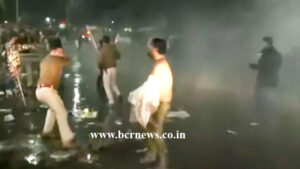
BCR NEWS (New Delhi): The Supreme Court today directed the governments of Uttar Pradesh and Uttarakhand to respond to a plea against verbal instructions by the authorities there not to release a movie in some districts of the two states.
The movie, Muzaffarnagar the Burning Love, is a love story of a Hindu boy and a Muslim girl and set in backdrop of the 2013 Muzaffarnagar riots in Uttar Pradesh.
The film has already been released across the country barring some districts of Uttar Pradesh and Uttarakhand — Muzzaffarnagar, Meerut, Saharanpur, Shamli, Baghpat, Ghaziabad and, Haridwar and Bijnor.
A bench comprising Chief Justice Dipak Misra and Justices A M Khanwilkar and D Y Chandrachud asked the petitioners counsel to serve the copy of the plea to the standing counsel of thetwo states and posted the matter for December 11.
Morna Entertainment Pvt Ltd, producer of the movie, had approached the top court seeking directions to the authorities of these districts to allow the films screening without any hindrance or obstruction.
The plea also sought directions to provide adequate security
for its screening, besides a compensation of Rs 50 lakh due to the loss of business suffered by them.
It has alleged that the authorities of these districts had “illegally and without any authorisation” warned and threatened the cinema theatres not to screen the movie which was scheduled to be released on November 17 this year.
It said the movie was granted UA certificate by the Central Board of Film Certification (CBFC) and the censor board had cleared it to be shown to the audience.
“In fact the certificate also mentions the fact that the excisions and modifications imposed by the board has also been duly carried out,” the plea said.
It claimed that when the film was about to be released on November 17 all across the nation, it was communicated to the petitioner and its distributor that the movie would not be released in these districts of Uttar Pradesh and Uttarakhand.
The plea alleged that the authorities had not issued any formal order to the theatres “but only on verbal instructions, the release of motion picture has been stalled thereby causing a great financial loss to the petitioner and also violating the fundamental right…”
It claimed that after they got to know about it, they contacted the respective district administrations but they blatantly refused to screen the movie on the pretext of law and order situation.
The petitioner alleged that verbal instructions werte issued by the authorities for not releasing the movie which was patently illegal, unwarranted and arbitrary exercise of power.
It has also claimed that the move violated their right to freedom of free speech and to trade as enshrined under the Constitution.







